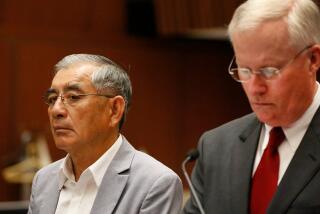Magistrate Denies Bail for Suspect in Spy Case
- Share via
Calling her a flight risk and potential threat to national security, a federal magistrate denied bail Tuesday to Katrina Leung, a longtime FBI informer accused of working as a Chinese double agent.
U.S. Magistrate Victor Kenton ordered the wealthy San Marino businesswoman jailed at the federal Metropolitan Detention Center pending her trial on a charge of illegally obtaining classified documents from her FBI handler, with whom she carried on a 20-year sexual relationship.
The agent, James J. Smith, now retired, was charged with gross negligence in the handling of national security documents and freed on $250,000 bond following his arrest April 9 along with Leung.
During a four-hour hearing before Kenton on Tuesday, Leung’s lawyers argued that she was more deserving of bail than Smith.
At one point, defense attorney Janet Levine wondered aloud whether prosecutors were motivated by prejudice in seeking detention for Leung, a naturalized U.S. citizen who was born in China.
Assistant U.S. Atty. Rebecca Lonergan denounced the suggestion as outrageous and untrue. Lonergan contended that if allowed to go free on bond, Leung might flee to China, where she has friends in high places and which does not have an extradition treaty with the United States.
Although Leung, 49, and her family had offered to post as much as $2 million in property to secure her freedom, Lonergan argued that the defendant had possibly millions of dollars stashed away in hidden foreign bank accounts, money she could use if she chose to flee.
The prosecutor described Leung’s foreign assets as “enormous and complex,” and charged that the suspect had concealed her overseas earnings in her annual U.S. tax returns.
Lonergan also asserted that while working as a paid informant, Leung made about 15 overseas trips between 1989 and 2002 without telling her FBI handler.
And just last month, the prosecutor said, Leung was offered a five-year visa to China during a meeting with the deputy chief of mission at the Chinese Embassy in Washington.
But defense attorney Levine and co-counsel John Vandevelde accused the government of distorting the facts about Leung’s conduct.
Levine said that Leung has had opportunities to flee since December, when FBI agents searched her home and interviewed her at length over seven days.
During her interrogation, Vandevelde said, Leung cooperated with the FBI, volunteering information and documents, despite the fact that she had been presented with a search warrant that said she was suspected of committing an act of espionage carrying a possible death sentence. The actual charge against her carries a maximum 10-year prison term.
Vandevelde also said that Leung gave advance notice to FBI investigators about her meeting with the Chinese diplomat in Washington last month and reported afterward on what transpired.
“Ms. Leung was exceedingly candid and forthcoming with the FBI,” said Vandevelde. “In contrast, agent Smith withheld information when he was questioned in this investigation.”
The defense lawyers suggested that Leung be placed on home detention with electronic monitoring of her movements. Leung’s husband, brother and sister attended the hearing and indicated they were willing to post assets for her bail.
In deciding against releasing her, Kenton cited an FBI statement that the agency has been forced to review a number of national security cases to determine whether they were compromised by unauthorized information that Leung might have passed to China.
“The court cannot conclude that the defendant does not pose a danger to national security,” he said.
More to Read
Sign up for Essential California
The most important California stories and recommendations in your inbox every morning.
You may occasionally receive promotional content from the Los Angeles Times.













